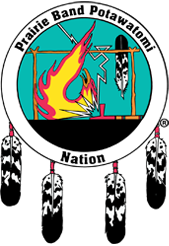16281 Q Road, Mayetta, KS 66509 | P. 785-966-4048

In 2023, the Prairie Band Potawatomi Nation applied for and received a grant from the National Park Service to establish a Tribal Historic Preservation Office (THPO). The THPO works to document and protect cultural and historic resources on Tribal lands.
The Tribal Historic Preservation Office’s responsibilities and duties include:
- Executing the Historic Preservation Plan
- Maintaining responsibilities of Section 106 of the National Historic Preservation Act (NHPA)
- Pursuing repatriation of ancestral remains and associated funerary objects from various institutions (NAGPRA)
- Engages government-to-government contact with Federal, State, and Local Municipal agencies whose projects may affect similar cultural resources on non-tribal property
- Providing community outreach, education, and training about tribal historic preservation
- Establishing and maintaining an inventory of Cultural Resources, Historic Places/Cultural Sites, Collections, and Archives
- Assisting, reviewing, and making recommendations for historic property/traditional property nominations to the state, federal, and PBPN Registers of Historic Places
About the National Historic Preservation Act (NHPA)
The National Historic Preservation Act (NHPA) established a partnership between the federal government and tribal, state, and local governments to protect, preserve, and review the responsible use of historic properties, defined as places included in or eligible for the National Register of Historic Places. Section 106 of the NHPA created the framework for consultation requiring federal agencies to consider the proposed undertaking’s impact on historic properties before implementation, including determining how properties may be affected and resolving any adverse effects to such property.
About Native American Graves Protection & Repatriation Act (NAGPRA)
NAGPRA requires federal agencies and museums, universities/colleges, and other institutions that receive federal funding to identify and inventory Native American cultural items under their control. NAGPRA established a process for lineal descendants, Indian Tribes, and Native Hawaiian Organizations to request that cultural items be repatriated.
Contact Information:
Tara Mitchell
Deputy Tribal Historic Preservation Officer
Office: 785-966-3984
Email: TaraMitchell@pbpnation.org
Raphael J Wahwassuck
Tribal Council Member
Tribal Historic Preservation Officer
Office: 785-966-4048
Email: RaphaelWahwassuck@pbpnation.org
PROJECTS
Oral History Project
The THP Office is currently conducting an Oral History Project to document and preserve tribal oral histories and cultural traditions which have not been included in existing historical records. In the past, tribal historical records have been limited to formal documentation such as government treaties and collected ephemera such as photographs and cultural artifacts. Within the PBPN community, more nuanced knowledge of tribal history has been orally transmitted down through the generations, but these stories and traditions are at risk of being lost due to the erosion of oral history and storytelling practices. In contemporary society, the ubiquity of not only English literacy but also digital literacy has weakened both the practice of and ability to listen, remember, and share oral histories as tribal members increasingly rely on written or digitally recorded information that can be easily and instantaneously accessed. At risk of losing the valuable memories, traditional wisdom, and cultural practices of previous generations, the Nation seeks to work with today’s tribal elders to record and preserve their stories, including received tribal history, knowledge of cultural traditions, and personal lived experiences, such as memories of PBPN Reservation schools.
Cemetery and Unmarked Burial Site Project
The THP Office is actively researching and gathering information, maps, or documents regarding cemeteries and unmarked graves located on the reservation. Information collected and scanned will not be available to the general public.
This project aims to protect, preserve, and prevent disturbance of cemeteries and unmarked burial sites.
